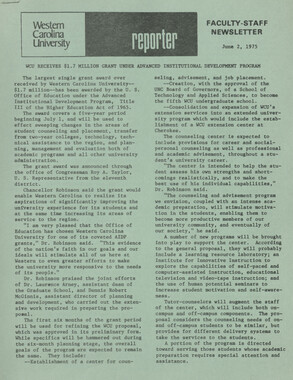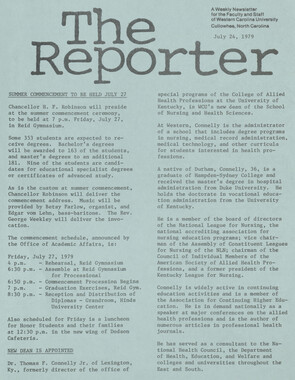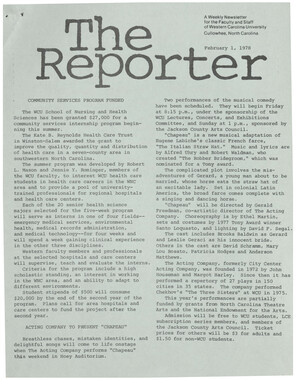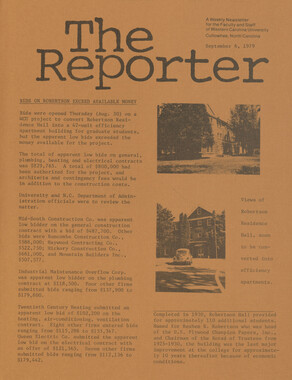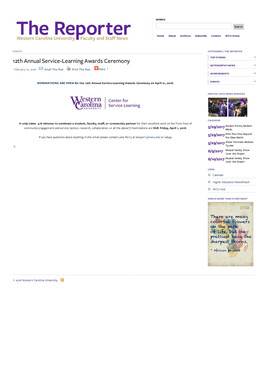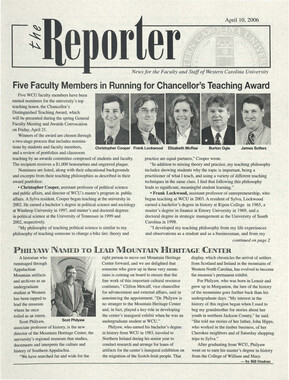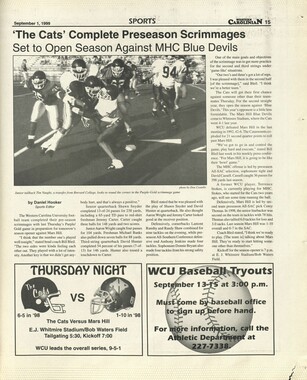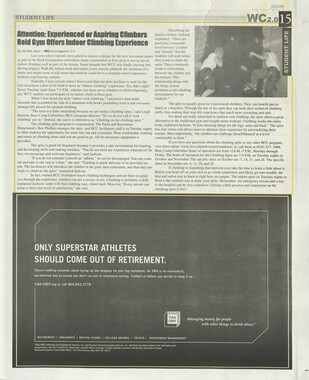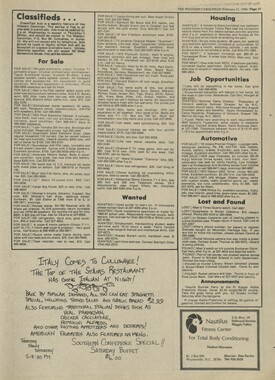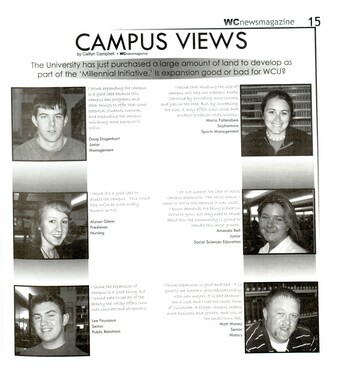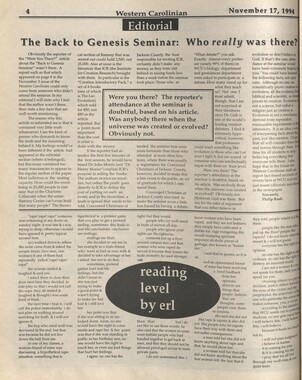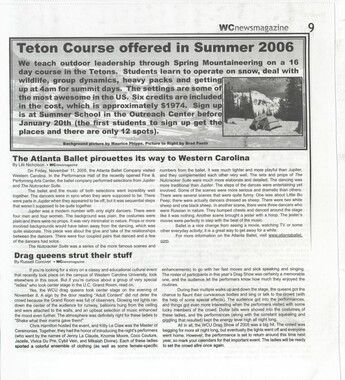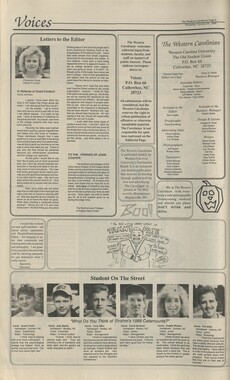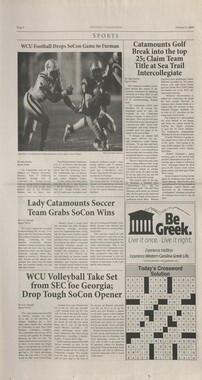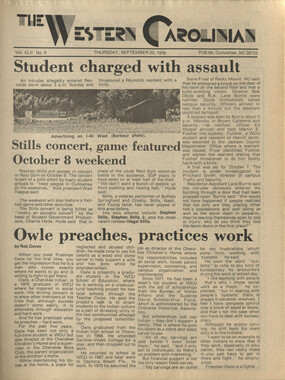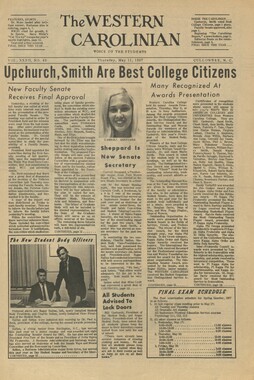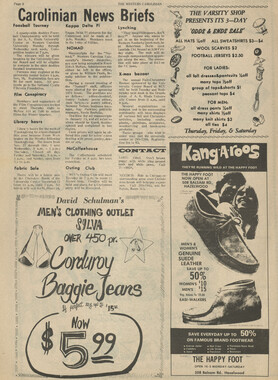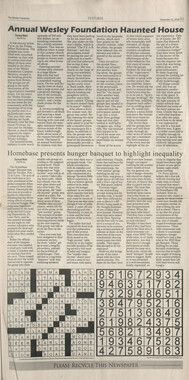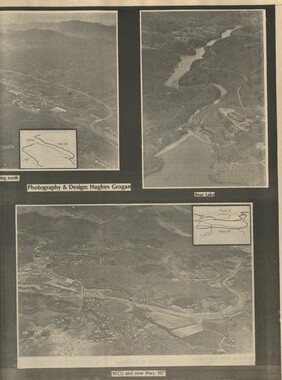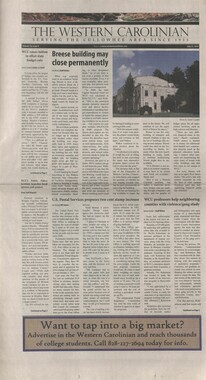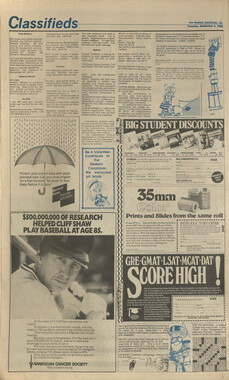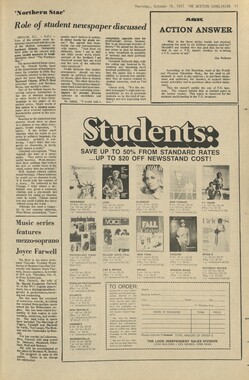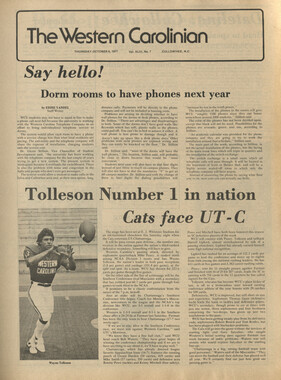Western Carolina University (21)
View all
- Canton Champion Fibre Company (2308)
- Cherokee Traditions (291)
- Civil War in Southern Appalachia (165)
- Craft Revival (1942)
- George Masa Collection (137)
- Great Smoky Mountains - A Park for America (2900)
- Highlights from Western Carolina University (422)
- Horace Kephart (973)
- Journeys Through Jackson (159)
- LGBTQIA+ Archive of Jackson County (85)
- Oral Histories of Western North Carolina (316)
- Picturing Appalachia (6797)
- Stories of Mountain Folk (413)
- Travel Western North Carolina (153)
- Western Carolina University Fine Art Museum Vitreograph Collection (129)
- Western Carolina University Herbarium (92)
- Western Carolina University: Making Memories (738)
- Western Carolina University Publications (2491)
- Western Carolina University Restricted Electronic Theses and Dissertations (146)
- Western North Carolina Regional Maps (71)
- World War II in Southern Appalachia (131)
University of North Carolina Asheville (6)
View all
- Allanstand Cottage Industries (62)
- Appalachian National Park Association (53)
- Bennett, Kelly, 1890-1974 (1463)
- Berry, Walter (76)
- Brasstown Carvers (40)
- Carver, George Washington, 1864?-1943 (26)
- Cathey, Joseph, 1803-1874 (1)
- Champion Fibre Company (233)
- Champion Paper and Fibre Company (297)
- Cherokee Indian Fair Association (16)
- Cherokee Language Program (22)
- Crowe, Amanda (40)
- Edmonston, Thomas Benton, 1842-1907 (7)
- Ensley, A. L. (Abraham Lincoln), 1865-1948 (275)
- Fromer, Irving Rhodes, 1913-1994 (70)
- George Butz (BFS 1907) (46)
- Goodrich, Frances Louisa (120)
- Grant, George Alexander, 1891-1964 (96)
- Heard, Marian Gladys (60)
- Kephart, Calvin, 1883-1969 (15)
- Kephart, Horace, 1862-1931 (313)
- Kephart, Laura, 1862-1954 (67)
- Laney, Gideon Thomas, 1889-1976 (439)
- Masa, George, 1881-1933 (61)
- McElhinney, William Julian, 1896-1953 (44)
- Niggli, Josephina, 1910-1983 (10)
- North Carolina Park Commission (105)
- Osborne, Kezia Stradley (9)
- Owens, Samuel Robert, 1918-1995 (11)
- Penland Weavers and Potters (36)
- Roberts, Vivienne (15)
- Roth, Albert, 1890-1974 (142)
- Schenck, Carl Alwin, 1868-1955 (1)
- Sherrill's Photography Studio (2565)
- Southern Highland Handicraft Guild (127)
- Southern Highlanders, Inc. (71)
- Stalcup, Jesse Bryson (46)
- Stearns, I. K. (213)
- Thompson, James Edward, 1880-1976 (226)
- United States. Indian Arts and Crafts Board (130)
- USFS (683)
- Vance, Zebulon Baird, 1830-1894 (1)
- Weaver, Zebulon, 1872-1948 (58)
- Western Carolina College (230)
- Western Carolina Teachers College (282)
- Western Carolina University (2008)
- Western Carolina University. Mountain Heritage Center (18)
- Whitman, Walt, 1819-1892 (10)
- Wilburn, Hiram Coleman, 1880-1967 (73)
- Williams, Isadora (3)
- Cain, Doreyl Ammons (0)
- Crittenden, Lorraine (0)
- Rhodes, Judy (0)
- Smith, Edward Clark (0)
- Appalachian Region, Southern (2940)
- Asheville (N.C.) (1944)
- Avery County (N.C.) (26)
- Blount County (Tenn.) (195)
- Buncombe County (N.C.) (1680)
- Cherokee County (N.C.) (283)
- Clay County (N.C.) (556)
- Graham County (N.C.) (238)
- Great Smoky Mountains National Park (N.C. and Tenn.) (525)
- Haywood County (N.C.) (3573)
- Henderson County (N.C.) (70)
- Jackson County (N.C.) (4919)
- Knox County (Tenn.) (35)
- Knoxville (Tenn.) (13)
- Lake Santeetlah (N.C.) (10)
- Macon County (N.C.) (421)
- Madison County (N.C.) (216)
- McDowell County (N.C.) (39)
- Mitchell County (N.C.) (135)
- Polk County (N.C.) (35)
- Qualla Boundary (982)
- Rutherford County (N.C.) (78)
- Swain County (N.C.) (2185)
- Transylvania County (N.C.) (270)
- Watauga County (N.C.) (12)
- Waynesville (N.C.) (86)
- Yancey County (N.C.) (72)
- Aerial Photographs (3)
- Aerial Views (60)
- Albums (books) (4)
- Articles (1)
- Artifacts (object Genre) (228)
- Bibliographies (1)
- Biography (general Genre) (2)
- Cards (information Artifacts) (38)
- Clippings (information Artifacts) (192)
- Copybooks (instructional Materials) (3)
- Crafts (art Genres) (622)
- Depictions (visual Works) (21)
- Design Drawings (1)
- Digital Moving Image Formats (2)
- Drawings (visual Works) (185)
- Envelopes (101)
- Exhibitions (events) (1)
- Facsimiles (reproductions) (1)
- Fiction (general Genre) (4)
- Financial Records (12)
- Fliers (printed Matter) (67)
- Glass Plate Negatives (381)
- Guidebooks (2)
- Internegatives (10)
- Interviews (817)
- Land Surveys (102)
- Letters (correspondence) (1045)
- Manuscripts (documents) (618)
- Maps (documents) (177)
- Memorandums (25)
- Minutes (administrative Records) (59)
- Negatives (photographs) (6090)
- Newsletters (1290)
- Newspapers (2)
- Notebooks (8)
- Occupation Currency (1)
- Paintings (visual Works) (1)
- Pen And Ink Drawings (1)
- Periodicals (193)
- Personal Narratives (10)
- Photographs (12976)
- Plans (maps) (1)
- Poetry (6)
- Portraits (4568)
- Postcards (329)
- Programs (documents) (181)
- Publications (documents) (2444)
- Questionnaires (65)
- Relief Prints (26)
- Sayings (literary Genre) (1)
- Scrapbooks (282)
- Sheet Music (2)
- Slides (photographs) (402)
- Songs (musical Compositions) (2)
- Sound Recordings (796)
- Specimens (92)
- Speeches (documents) (18)
- Tintypes (photographs) (8)
- Transcripts (324)
- Text Messages (0)
- A.L. Ensley Collection (275)
- Appalachian Industrial School Records (7)
- Appalachian National Park Association Records (336)
- Axley-Meroney Collection (2)
- Bayard Wootten Photograph Collection (20)
- Bethel Rural Community Organization Collection (7)
- Blumer Collection (5)
- C.W. Slagle Collection (20)
- Canton Area Historical Museum (2110)
- Carlos C. Campbell Collection (462)
- Cataloochee History Project (64)
- Cherokee Studies Collection (4)
- Daisy Dame Photograph Album (5)
- Daniel Boone VI Collection (1)
- Doris Ulmann Photograph Collection (112)
- Elizabeth H. Lasley Collection (1)
- Elizabeth Woolworth Szold Fleharty Collection (4)
- Frank Fry Collection (95)
- George Masa Collection (173)
- Gideon Laney Collection (452)
- Hazel Scarborough Collection (2)
- Hiram C. Wilburn Papers (28)
- Historic Photographs Collection (236)
- Horace Kephart Collection (861)
- Humbard Collection (33)
- Hunter and Weaver Families Collection (1)
- I. D. Blumenthal Collection (4)
- Isadora Williams Collection (4)
- Jesse Bryson Stalcup Collection (47)
- Jim Thompson Collection (224)
- John B. Battle Collection (7)
- John C. Campbell Folk School Records (80)
- John Parris Collection (6)
- Judaculla Rock project (2)
- Kelly Bennett Collection (1482)
- Love Family Papers (11)
- Major Wiley Parris Civil War Letters (3)
- Map Collection (12)
- McFee-Misemer Civil War Letters (34)
- Mountain Heritage Center Collection (4)
- Norburn - Robertson - Thomson Families Collection (44)
- Pauline Hood Collection (7)
- Pre-Guild Collection (2)
- Qualla Arts and Crafts Mutual Collection (12)
- R.A. Romanes Collection (681)
- Rosser H. Taylor Collection (1)
- Samuel Robert Owens Collection (94)
- Sara Madison Collection (144)
- Sherrill Studio Photo Collection (2558)
- Smoky Mountains Hiking Club Collection (616)
- Stories of Mountain Folk - Radio Programs (374)
- The Reporter, Western Carolina University (510)
- Venoy and Elizabeth Reed Collection (16)
- WCU Gender and Sexuality Oral History Project (32)
- WCU Mountain Heritage Center Oral Histories (25)
- WCU Oral History Collection - Mountain People, Mountain Lives (71)
- WCU Students Newspapers Collection (1923)
- Western North Carolina Tomorrow Black Oral History Project (69)
- William Williams Stringfield Collection (2)
- Zebulon Weaver Collection (109)
- African Americans (390)
- Appalachian Trail (35)
- Artisans (521)
- Cherokee art (84)
- Cherokee artists -- North Carolina (10)
- Cherokee language (21)
- Cherokee pottery (101)
- Cherokee women (208)
- Church buildings (190)
- Civilian Conservation Corps (U.S.) (111)
- College student newspapers and periodicals (2012)
- Dams (108)
- Dance (1023)
- Education (222)
- Floods (63)
- Folk music (1015)
- Forced removal, 1813-1903 (2)
- Forest conservation (220)
- Forests and forestry (1197)
- Gender nonconformity (4)
- Great Smoky Mountains National Park (N.C. and Tenn.) (181)
- Hunting (46)
- Landscape photography (25)
- Logging (119)
- Maps (83)
- Mines and mineral resources (9)
- North Carolina -- Maps (18)
- Paper industry (38)
- Postcards (255)
- Pottery (135)
- Railroad trains (72)
- Rural electrification -- North Carolina, Western (3)
- School integration -- Southern States (2)
- Segregation -- North Carolina, Western (5)
- Slavery (5)
- Sports (452)
- Storytelling (243)
- Waterfalls -- Great Smoky Mountains (N.C. and Tenn.) (66)
- Weaving -- Appalachian Region, Southern (280)
- Wood-carving -- Appalachian Region, Southern (328)
- World War, 1939-1945 (173)
The Reporter, May 1977
-
The Reporter is a publication produced by Western Carolina University featuring news, events, and campus community updates for faculty and staff. The publication began in August of 1970 and continues digitally today. Click on the link in the “Related Mate
-
-
The Reporter • A Weekly Newsletter for the Faculty and Staff of Western Carolina University/ Cullowhee, N.C./May 5, 1977 AN ANNOUNCEMENT FROM GRAHAM INFIRMARY Currently, we are having an outbreak of rubella measles (three-day measles or German measles) on campus. The only danger this poses is to the unborn babies of pregnant women in the community. These women are encouraged to see their obstetrician to check their antibodies against rubella. This test may have already been performed if they have completed the blood tests on their early obstetrical visits. The dangers of rubella to the developing baby are major and minor birth defects depending on the stages of development. Other individuals develop a mild cold for 2-5 days and a fine rash over the body for the last 3 days. The patient is contagious until the rash begins to fade. Again, if you are pregnant and have been exposed to rubella, please see your obstetrician and check to see if you are susceptible. REGISTRATION SET tfOR SUMMER, FALL Early registration for the 1977 Summer School and Fall Semester begins with advising this week. Registration materials for the 1977 Summer School, and for the big one, FALL SEMESTER, are available on the second floor of Hinds University Center. These materials include the Manual for Semester Conversion and another helpful publication called "What's a Semester?" The Gtandroom will be open 9 a.m. to 4 p.m. on May 10 for early summer registration. No appointment time is assigned for summer registration. When students pick up their registration materials for fall semester, they will be given a permit to register and an appointment time for early fall registration, set for Wednesday and Thursday, May 11 and 12. MATH CONTEST DRAWS 639 CONTESTANTS Students from Brevard High School won first place in three out of four divisions as their school took top honors in the seventh annual WCU High School Mathematics Contest held here Thursday. Second place went to T. C. Rober-son High School, followed by Tuscola High School in third place in senior high competition. Waynesville Junior High School won in the junior high competition. Some 639 students from 46 junior and senior high schools took part in the contest, which was sponsored by the WCU Department of Mathematics. Contest chairman was Ralph H. Willis, WCU assistant professor of mathematics. Chancellor Robinson presented $300 scholarships to seven top scores in the comprehensive division who expect to attend WCU next fall. Awards also were presented to three WCU students for excellence in mathematics. The Outstanding Senior Award went to Greg Hawkins of Murphy. Outstanding Freshman awards were presented to Harold Coward of Sylva and Teresa Biddix of Marion. MOORE HALL BIDS TOO HIGH Apparent low bids opened April 27 on a proposed major renovation of Moore Hall appeared to exceed funds available for construction. The total of apparent low base bids on the renovation project was $643,194, and available funds, after allowances for architectural fees, required funds for contingencies, and engineering tests are somewhat less, according to WCU officials. Apparent low bidder on the general contract was Mountain Builders Inc. of Waynesville, $415,684. Other apparent low bidders were: plumbing, Plemmons Plumbing and Heating Co. of Waynesville, $37,345; mechanical, Bolton Corporation of Charlotte, $107,320 and electrical, Overcash Electric Co. Inc. of Moores-ville, $82,845. Moore Hall, erected in 1924 as a dormitory, is one of the oldest structures at WCU. In recent years, it has been used as an academic building. The renovation work, designed by Jackson, Padgett and Freeman, Asheville architectural firm, would convert it to classroom, laboratory and office uses and include building and roof repair, replacement of the plumbing, heating and electrical systems, and installation of a passenger elevator. All bids received Wednesday are being reviewed by university and state officials. STUDENTS HEADED FOR MED SCHOOL Two Western Carolina University students have received University of North Carolina Board of Governors Medical Scholarships. They are among five WCU students to be accepted this year for study in medical and dental school. The two scholarship winners are Michael Claude Burnette of Rt. 3 Canton and Debbie Kay Wright of Rt. 1 Garys-burg. The scholarship, which provides a $4,000 stipend and full payment of tuition and fees annually, is awarded to 15 North Carolina residents each year. The other students accepted for medical and dental study are Robert McDuffie of Asheville, Gary Grindstaff of Rt. 1 Old Fort, and Renwick Hood of Charlotte. Burnette will be attending the University of North Carolina Medical School, and Miss Wright will be attending Bowman Gray Medical School in Winston-Salem. Both are biology majors who attended WCU on a Patrons of Quality Scholarship. Grindstaff, a graduate student in biology, plans to attend the University of North Carolina Dental School. He is listed in "Who's Who Among Students in American Universities and Colleges" and is a dean's list student. A resident assistant, Grindstaff played baseball for four years at WCU. McDuffie is a 1974 graduate of Duke University, where he majored in French. He has been accepted at both Chapel Hill and Bowman Gray. Hood is a 1976 graduate of Wake Forest University where he majored in English. He plans to attend Jefferson Medical School in Philadelphia. Although McDuffie and Hood did not graduate from WCU, they each spent a year at WCU pursuing further studies in biology and science before medical school. "The level of instruction is just as good here as in places like Wake Forest which sends 30-40 people to medical school each year," Hood oiommented. He added that he enjoyed his post-baccalaureate study at WCU because of the small classes and individual attention students get and the lack of intense competition found in some of the larger schools. COMING EVENTS Dr. Carl Vaught, associate head of the department of philosophy at Pennsylvania State University, will speak at 7:30 p.m., May 5, in the Grandroom of Hinds University Center on "The Quest for Wholeness: Melville's Moby Dick." Taken from his manuscript, "Religion and Concrete Relection," recently completed for publication, the lecture will introduce a combination of literary, religious and philosophical issues. Dr. Vaught received his B.A. degree in philosophy and religion from Baylor University and holds the M.A. and Ph.D. degrees in philosophy from Yale University. The longest single-day Whitewater canoe race in the Southeast -- the North Carolina C-2 Championship — will be held May 7 on the Tuckaseigee River. The 25-mile race, according to coordinator Roger Roundtree, will attract some of the top Whitewater and marathon paddlers in the Southeast. The race will begin at 11 a.m. in the community of Tuckaseegee at the confluence of the East and West forks of the river. The finish line is the Barker's Creek Bridge in the community of Whittier. The race is sponsored by the WCU University Center Board, the Jackson County Recreation Department, and Cullowhee Wilderness Outfitters. Three WCU choral organizations— the concert choir, the chorus, and the community chorus—will join the Ashe-ville Symphony for a performance of Carl Orff's "Carmina Burana" Saturday (May 7) at 8:15 p.m. in Thomas Wolfe Auditorium in the Asheville Civic Center. The concert, which will include a performance of Mozart's Symphony No. 40, will be conducted by Robert B. Welch (acting head, Music). Tickets will be available at the door. NAMES IN THE NEWS Joe Allen, graduate student in mental retardation, who is national chairman for Alpha Phi Omega's Special Olympics project, attended a meeting of the board of directors of the International Special Olympics, March 14- 15, Washington, D.C. At the meeting, Eunice Kennedy Shriver, president of the International Special Olympics, noted that the Olympics at Western are as organized, as varied, and as large as many state special Olympics. Martha B. White (Nursing and Health Sciences) presented a workshop, "Nursing Care of the Patient with a Stroke," April 7 at Mayland Technical Institute to nurses from Yancey County. •This workshop was presented earlier by Mrs. White to nurses at District Hospital in Andrews and at Haywood County Hospital. Larry Te.. ango (Director, Speech and Hearing Center) contributed a presentation on "Care in Aphonia" at Haywood County. Betty Siegel (Dean, Education and Psychology) was keynote speaker at the Annual Conference of the Illinois Home-makers Extension Federation in Urbana, Illinois, March 16. At the annual meeting of the National University Extension Association in Tuscon, Arizona, March 19-22, Dean Siegel, chairperson-elect of the Division of Administration, Policy and Planning of the NUEA, presided over the division meeting of all deans and associate deans of NUEA-affiliated universities in the country. Following the NUEA meeting, Dean Siegel addressed on March 24 a nine-county meeting of teachers and administrators in Belle Plaine, Kansas. The following day, Dean Siegel addressed 700 participants at a conference on women at Florida Technological University in Orlando, Florida. Laurence French (Sociology and Anthropology) presented his paper, "Watergate and Its Impact on American Justice," in the current events and crime session of the Southern Sociological Society meetings held in Atlanta March 29-April 1. John Chapman, John Wilcox, Steven Yurkovich, and Ernest Smith (all Earth Sciences) attended the annual meeting of the Southeastern Section Geological Society of America in Winston-Salem, March 23-25. Following the meeting Dr. Chapman spent two days in the field investigating rocks of the slate belt near Asheboro and near Charlotte. Donald W. Josif (Earth Sciences) participated in the annual meeting of the officers and steering committee of the North Carolina Geographical Society at Elon College April 1. Jane Hyatt (Home Economics) was a participant in a workshop for home economics teachers of western North Carolina on new concepts in housing and interior design held at Canton Western Regional Education Center April 21. Arnie Nielsen and Bob Wenig (both Industrial Education and Technology) recently attended an International Conference on Industrial Arts Education in New Orleans. Dr. Nielsen also has been appointed to the State Advisory Committee for Industrial Arts Education. Judith M. Stillion (Psychology) delivered an invited address entitled, "New Approaches to Instituting Death Education" at the March meeting of the Association for Supervision and Curriculum Development in Houston. Judith M. Stillion (Psychology) and Glenn W. Stillion, (vice chancellor, Student Development) made a presentation entitled "Techniques for Promoting Awareness of Sex Role Bias Among Student Development Personnel" at a recent meeting of the National Association of Student Personnel Administrators in Atlanta. Jeff Neff (Earth Sciences) is among 16 participants selected from Virginia, North Carolina, South Carolina, and Georgia to travel to India for a 9-week faculty development seminar on Indian art, religion, and culture. The program is being funded by the U.S. Office of Education and the Southern Atlantic States Association for Asian and African Studies and is being directed by the UNC-Charlotte International Studies Program. Tom O'Toole (History) will participate in a teaching workshop on "The Third World: Africa and Asia" at UNC-Charlotte, June 20-July 8. Lee Budahl (Art) presented a slide-lecture entitled "Art Criticism for Children" at the North Carolina- Virginia Art Education Association Conference in Asheville April 22. Hubert L. Youmans (Chemistry) has been selected as a reviewer of instructional media for Journal of College Science Teaching. He also participated in the North Carolina Educational Computing Service "Computers in Chemistry" workshop at Research Triangle Park, March 25-26. Ed Vassian (Chemistry) presented a paper at the Middle Atlantic American Chemical Society Regional Meeting in Newark, Delaware, April 23. The paper was entitled "Electrophillic Substitution of the Quasi-Aromatic Square Planer Nickel (II) Complex Ni(PnAO)-6H." Tom 0'Toole (History) taught a model lesson on ethnocentricism to a class of 6th and 7th graders at Fair-view School in Sylva, April 26. Andrew Baggs (Political Science) addressed the Jackson County Twentieth Century Club on "the Sino- Soviet Split" April 14. On April 15- 16, Dr. Baggs participated with 60 political scientists from 24 N. C. schools in the seventh annual conference of the North Carolina Political Science Association at Shaw »• University, N.C. State and at Meredith. Dr. Baggs was re-elected association secretary at the business meeting. William Lidh (Art) recently completed a woodcut portrait of John Jacob Niles. The portrait was presented to Mr. Niles as a gift on his eighty-fifth birthday at the Music Educators National Conference in Atlanta, April 27. The presentation was made by James Dooley (vice chancellor, Development and Special Services), president of the conference. Lidh also received a commission from the North Carolina Society for Original Graphics. The Raleigh-based society will purchase the entire edition of the woodcut and publish a reproduction of it and information on Lidh in their brochure, "Collector's Choice." T. L. Huguelet (English) attended the Southeastern Renaissance Conference April 1-2 at Folger Shakespeare Library in Washington. Dr. Huguelet serves as secretary-treasurer of the organization. He will be planning the 1978 convention to be held in Lexington, Ky., March 1-5, 1978, and will become president of the 10-state regional theatre conference in 1978. Thomas B. Westcott (coordinator of counseling, CAP Center) has co-authored an article entitled, "Several Variables of Importance in the Use of the Cold Pressor as a Noxious Stimulus in Behavioral Research." The article has been accepted for publication in Perceptual and Motor Skills, 1977. Betty Siegel, Mil Clark, Mary Jane Dillard, Nancy Sherrill, and Clarence DelForge (all Education and Psychology) gave a presentation at the national convention of the Association of Supervision and Curriculum Development in Houston, Texas, March 22. Richard Craddock, Betty Siegel, Tom Pickering, and Clarence DelForge (all Education and Psychology) visited the Wichita State Reading Center in Wichita, Kansas, on March 23. Cecil Cosper (Curriculum and Instruction) delivered addresses to the Phi Delta Kappa chapters of Win-throp College and Clemson University on March 19 and March 21, respectively. Platon G. Gailey (Curriculum and Instruction) attended Lecture Series IV at the Institute of Speech and Hearing Sciences, University of North Carolina at Chapel Hill, March 19 dealing with neurological models for communication disorders. J. Harold Anderson (Curriculum and Instruction) attended the annual convention of the Association for Supervision and Curriculum Development, Houston, Texas, March 19-23. The Reporter A Weekly Newsletter for the Faculty arid Staff of Western Carolina University/ Cullowhee, N.C./ May 11, 1977 ' ' I M i l ? RESULTS OF FACULTY ELECTIONS Ten faculty members have been elected to various elective positions on the campus. Elected to the Faculty Senate are James Horton, Ellerd Hulbert, John McCrone, Alice Mathews, Joseph Meigs, and Steven Yurkovich. Joseph Meigs and Max Williams have been elected as representatives to the Graduate Council, and Henry Mainwaring will serve as representative to the University Tenure and Promotion Advisory Committee. There will be a run-off election. A run-off election for one remaining seat in the Faculty Senate was to be held May 10. Fred Hinson and Edward Price were on the ballot in that contest. WCU STUDENTS RECEIVE PHOTO AWARDS Two WCU students have received awards in the first annual North Carolina Student Photography Exhibit sponsored by the Department of Art. An honorable mention was presented to Stokes Gatewood, and John Daughtry received a special recognition award. They were among 10 students who received awards. The exhibit, which includes 89 photographs by 14 students from 40 N.C. colleges, universities, and technical institutes, will remain on display through May 12 in the art gallery in WCU's Carol Grotnes Belk Building. VISITING MATHEMATICIANS TO SPEAK The Department of Mathematics will sponsor visiting scholars from Duke University and the University* of Illinois in May. Dr. Thomas M. Gallie, professor of computer science at Duke, will lecture at 4 p.m. May 11 on "Calculating Electrical Activity on the Heart from Body Surface Measurements," and at 11 a.m. May 12 on "What You Always Wanted to Know About the Moore-Penrose Pseudo- Inverse but Were Afraid to Ask." Dr. Franz E. Hohn, professor of .mathematics at the University of Illinois, will present lectures at 4 p.m. May 23 on "Role and Training of Mathematicians in Society," and at 11 a.m. May 24 on "What is Automaton?" All lectures will be held in 309 Stillwell Science Building and are open to the public without charge. BRASS QUINTET ON TOUR AGAIN The Piedmont Brass Quintet is currently making a ten-day tour of Georgia and Florida that includes two concerts at the Arts Festival of Atlanta. The group will perform on the main stage in Atlanta's Piedmont Park, site of the festival, May 17 at 2 a nd at 7 p.m. The remainder of the tour will include conqerts, master classes and band clinics. The schedule includes stops at Rome, George, May 10; Cedartown, Georgia, May 13; Marietta, Georgia, May 14; and Tampa, Florida, May 20. The Piedmont Brass Quintet is spending this year in residence at WCU. Members are Mary Lazarus Teague and Ned Gardner, trumpet; John Woolley, trombone, John Sizemore, tuba; and Gordon Campbell, French horn. WCU INTERNS LEARN VALUABLE SKILLS The word "intern" brings to most people's mind the image of a harried young doctor acquiring practical experience in the profession in a busy hospital after graduation from medical school. But there are other kinds of interns—artists, social workers, psychologists, political scientists, and journalists to name a few. And at WCU these interns are doing much the same things as the doctors— gaining practical experience in a profession or skill area learned in the classroom. Internships are not required for graduation in most programs, so what possesses students to leave the comfortable world of the classroom for the intern's immersion into the hard world of work? B. J. Smith, coordinator of the social work program, said there are several reasons. "Some people just need a few extra credit hours to graduate," she said, "but many students do internships because they want to see whether or not the^ want to be a social worker." *A third reason, and the most important one, according to psychology professor Taylor Huskins, is economic-students with work experience in their field of study find it easier to get a job. "We are finding employers want more practical experience," Huskins said. "That's why we initiated the internship program." Another reason that interns have better chances at finding jobs after graduation, according to Dr. Quinn Constantz, coordinator of the health, physical education, and recreation interns, is that internships enable students to make personal contacts with prospective employers while other students have to start looking for jobs from scratch. Debra Ellen-burg, a journalism intern with the 'estern Economic Development Organization in Hazelwood, had another reason. "I was just tired of school," she said, "and wanted to get out into the working world." Many interns have even turned their internship into a permanent job. Dr. Hal Salisbury, WCU internship coordinator, said "it's not an uncommon occurrence for students to get jobs with the same agency they served an internship with." All internships have several things in common. The intern must be an upperclassman and the internship must be done in his major field of study. The intern is supervised academically by his advisor and on the job by the professional with whom he works. Karen Miller, a senior from Black Mountain majoring in sociology, is interning as a social worker with the Juvenile Evaluation Center in Swannanoa. In addition to participating as a social worker intern during the day, she has to keep a journal with complete field notes, read several books relating to her job, participate in conferences with her advisor, and at the end of the internship, write a paper explaining her experiences. "This experience has really taught me the difference between reality and theory," she commented. She also hinted that there may be a permanent job opening where she works soon and she hopes to a ->ly for it after graduation. Students can participate in internships in several ways, according to Dr. Salisbury. "An industry may call for an intern, the student may seek out an agency on his own for internship, or students can apply through their advisor for an internship," he said. Internships need not be full time, either. Students can serve part-time internships and get only partial credit. Where do interns go to do their work? Almost everywhere, really-business, government, and private firms. Western interns have served in many different places including private law firms, police departments, Job Corps centers, state and federal mental health agencies, businesses, and as aides to congressmen. And although the work is hard, many times there is no money available to pay the intern--"the pay is in the e 3q?erience gained," as Huskins says. Even though most interns are not paid, seme land internships which provide stipends of $ 150 per week . "We try to find some stipend or fringe benefit, or at leas t m ,:e it convenient for the student when we select an agency fcr an internship," Huskins said. He explained that if a stipend is not provided, he tries to locate the intern near WCU or the student's home so living expenses wen't be ao great. Not only does the internship program benefit the student, but two of the coordinators, B. J. Smith and Dr. Chan Carpenter, indicated that the agency benefits too. "When you have someone new around and have to teach them the way things are done in an agency, you have to take a new look at what you are doing," Miss Smith said. Carpenter, head of the political science department, recalled that several years ago two political science interns took a collection of ordinances which the Cherokee Tribal Council had passes and organized them into a standard municipal code which made their use much easier than in loose-leaf form. Any employer or agency interested in sponsoring an internship should contact Dr. Hal Salisbury, director of continuing education. WCU PITCHES IN TO HELP MENC MEETING The annual meeting of the Music Educators National Conference, Southern Division, held in Atlanta April 27-30, owes a lot to Western Carolina University people. To begin with, Dr. James E. Dooley (vice chancellor, Development and Special Services) was in charge of planning and organizing the entire meeting in his capacity as president of the Southern Division. Dr. Eva Adcock (Music), with help from the WCU student chapter of MENC, organized sessions celebrating John Jacob Niles's 85th birthday April 28. The celebrations included a sugarless cake baked by Mrs. John Rivers of Cullowhee. Gifts presented to Niles included a woodcut portrait of the singer created by Bill Lidh (Art) and presented by Dr. Dooley, and a walnut plaque in the shape of a dulcimer, complete with pegs, frets, and a red velvet bow, inscribed "John Jacob Niles—Dean of American Balladiers," which was designed and built by Jerry Priesner (Industrial Education and Technology). Dr. Adcock and Eddie Stanley, president of the WCU students MENC, presided at an April 29 session at which Niles performed. Robert B. Welch (acting head, Music) presided at the College Band Directors' National Association conducting clinic. A REMINDER If you completed ten years of state service before June 30, 1974, and are a military veteran or a former employee of another state, you may be eligible to purchase credit toward N.C. retirement for that prior service, but you'll need to act quickly. Payment for the purchase of service credits is due in Raleigh by May 30, and you may need to collect letters from former employers verifying your prior service. The WCU Personnel Office has kits for obtaining out-of-state service credit, and sample form letters for military service credit and the repurchase of credit for former N.C. employees who withdrew their retirement contributions and later returned to N.C. and worked for 10 years. The Personnel Office also can answer your questions about purchasing service credit. Call them today, before you lose your chance to take advantage of the new N.C. law. NAMES IN THE NEWS Arnie Nielsen and Sam White (both Industrial Education and Technology) recently attended a two-day Society of Plastics Engineers Educational Seminar in Greenville, S. C. Judy H. Dowell (Home Economics) recently attended the National Vocational Home Economics Education Workshop in Ft. Worth, Texas. The major topic was "Education Amendments of 1976: Implications and Recommendations for Implementing, Redirecting and Reorienting Vocational Home Economics Education Programs, Services, and Activities." Salvatore Nerboso (Political Science) attended a North Carolina Association of Educators workshop on collective bargaining in Asheville March 26. Richard Craddock (head, Elementary Education) presented two workshop sessions on alternative teaching strategies at UNC-Chapel Hill, March 15-16, for the annual N.C. Conference of Junior High/Middle School Administrators. Tom Warren, Virgie Mclntyre, Thurza McNair, and Richard Craddock (all Education and Psychology) attended the annual meeting of the N.C. Council of the International Reading Association in Winston-Salem, March 16-19. The four were responsible for presenting a program session on "Teaching Beginning Reading via an Individualized Language Experience Approach." Tom Warren (Elementary Education) has recently been elected to a two-year term as secretary-treasurer of the N.C. Association of College Professors of Reading. Gordon Sanford and Raymond Fere11 (both CIML) presented a joint paper, "Are Location Quotients Useful in Rural Area Development?", at the annual meeting of the Southern Regional Science Association in Birmingham, Alabama, April 13-15. Dr. Ferell also served as discussant for another paper on simulated input-output models for economic base analysis. Paul Haberland (Modern Foreign Languages) has been elected president of the N.C. chapter of the American Association of Teachers of German. Gayle Willis (secretary, Sociology and Anthropology) was named "Secretary of the Day" April 18 by radio station WWNC in Asheville. Gene Perrotta (Haywood area team supervisor, Developmental Evaluation Center) will speak on "The Appalachian Family" at the Medical Social Consultant's 1977 annual meeting Saturday Family" at the Medical Social Consultant's 1977 annual meeting Saturday at the Conrad Hilton Hotel in Chicago. David Blalock (Speech and Hearing Center) was elected Counselor for Training Programs at the North Carolina Speech, Hearing and Language Association Convention held in Asheville, April 14-16. Larry Terango (director, Speech and Hearing Center) has been informed that his booklet, Early Recognition of Speech, Hearing and Language Disorders in Children Under Six Years of Age, will be published in May by The Interstate Printers and Publishers, Inc., Danville, 111. PUBLICATIONS Nora Graves, "Shirley-T. in Eudora Welty's 'Why I Live at the P.O.,"' Notes on Contemporary Literature, March, 1977. T. L. Huguelet, five articles "Martin Bucer," "Sir John Cheke," "Raphael Holinshed," "Joseph Hall," and "Edward Coke," in The Milton Encyclopedia, Bucknell University Press, 1977. Tom 0'Toole, "The Historian of Africa as Teacher and Learner," The Social Studies, LXVIII (Jan./Feb., 1977); "Using the Personalized System of Instruction of Teach African History," African Studies Rev:ew, in press; and three reviews, of Roots, by Alex Haley, and Africa: Teaching Perspectives and Approaches, John E. Willmer, ed., both in The Bulletin of the Southern Association of African-ists, V (January, 1977), and of Volunteers in Asia, Trans-Culture Study Guide, by Volunteers in Asia, Inc., in South Atlantic States Association of South Asian and African Studies Review, II (Spring, 1977). Arnold M. Nielsen, 'Common Law and Its Implications In Teacher Liability,' NCIAA The Bulletin, March, 1977. The Reporter A Weekly Newsletter for the Faculty and Staff of Western Carolina University/ Cullowhee, N.C./ May 18, 1977 TEN NEW DEGREE PROGRAM TRACKS AUTHORIZED IN HOME EC, CHEMISTRY, STA, AND TECHNOLOGY Western Carolina University last week announced the establishment of 10 new degree program tracks, the largest single expansion of its academic offerings in recent years. The new offerings are "a significant enlargement of the educational opportunities in Western North Carolina and are a major forward step for the people of this region," Chancellor Robinson said. The programs, or "tracks," were authorized by the University of North Carolina general administration, developed by academic officers and university committees during the past several months, and all but one will begin with the fall semester in August, Dr. Robinson announced. The new offerings are: 1. Bachelor of Science degree in Consumer Economics and Home Management. 2. Bachelor of Science degree in Child Development and Family Relations. 3. Bachelor of Science degree in Interior Design, Housing, and Equipment. 4. Bachelor of Science degree in Clothing and Textiles. 5. Bachelor of Science degree in Food, Nutrition, and Dietetics. 6. Bachelor of Science degree in Industrial Chemistry. 7. Bachelor of Science degree in Radio and Television. 8. Bachelor of Arts degree in Radio and Television. 9. Bachelor of Fine Arts degree in Theatre. 10. Master of Industrial Technology degree. Dr. Robinson said the new degrees were "carefully selected for development at WCU because a need exists for degree-holding specialists in these fields, they offer real career opportunities for students, and, in many instances, the four-year degree,- program will make it possible for students now in similar programs in two-year institutions to continue their preparation." In addition to the 10 degree tracks announced Tuesday, Dr. Robinson said WCU committees are at work on three other new degree program tracks already authorized by the Unir versity of North Carolina. They are a Master of Arts in Education degree in Gifted and Talented, a Bachelor of Science in Education degree in Occupational Education, and a Bachelor of Science degree in Health Care Management. Dr. Robert E. Stoltz, vice chancellor for academic affairs, said the 10 tracks announced Tuesday are "full degree offerings designed to meet the specific noeds of our region. They are major opportunities for students already enrolled at Western, for next year's freshmen, for students at two-year schools and for many residents of the region who are now employed but who are seeking additional career preparation." The first five tracks listed by Dr. Robinson are in the field of home economics and Dr. Robinson said each was developed in accord with guidelines of the American Home Economics Association, the national accrediting agent for undergraduate home economics programs. The consumer economics track, he said, was developed in cooperation with the North Carolina Agricultural Extension Service, the Consumer Credit Services Organization and other allied agencies that will provide internships for students majoring in the program. The WCU curriculum, he said, will meet the requirements of the Extension Service and of North Carolina State University for internships and extension agents. The curriculum in design will meet the requirements of the American Society of Interior Designers, the chancelV>r said. He noted that national studies project 3,000 job openings annually in the field of interior design. In the South, he said, the expansion of employment in the field exceeds the national rate. In clothing and textiles, he said, the job openings projected through 1980 run far ahead of the number of projected graduates. The food, nutrition, and dietetics track, he said, is designed to meet the academic requirements of the American Dietetic Association and Western graduates would move into a field where, in North Carolina alone, the forecast is for a need for twice the number of dietitians as cure now employed. The career opportunities in child development and family relations are expected to be even greater, Dr. Robinson said, with national forecasts of 23,000 openings by 1980 compared with about 5,300 graduates in the field. All of the five degrees "are career-oriented and will prepare students for a variety of careers in public and business settings," Dr. Robinson said. The industrial chemistry program track, the chancellor said, "would have the objective of preparing students principally for non-research jobs in industry requiring a background both in chemistry and in such areas as production supervision and quality control." The chemistry program is scheduled to begin in August, 1978. Many of the career opportunities in industrial chemistry are ones for which companies must provide the training because few formal college or university programs exist, Dr. 'Robinson noted. He said Western's curriculum will combine academic work in chemistry, communications business and industrial education and technology. The university's standard chemistry program will continue, but the chancellor said consultations with major regional industrial firms indicate a strong need for the industrial chemistry offering. The university's new Natural Sciences Building contains a central instrumentation laboratory essential to an industrial chemistry program. The two new degree tracks in radio and television will be interdepartmental, utilizing resources in the departments of speech and theatre arts, industrial education and technology, curriculum and instruction, art, English, political science, business law, and management and marketing. Dr. Robinson said WCU expects to develop opportunities for educational internships with regional radio and television stations and already is assured of an internship arrangement with one national radio network. Western has offered minors in radio, television, film and journalism for some years and these courses will provide a base for the new offering, Robinson said. The new program track in theatre, also to be offered in the Department of Speech and Theatre Arts, Dr. Robinson said, has the endorsement of the North Carolina Theatre Conference and has been developed to* meet the accreditation standards of the American Theatre Association and the National Association of Schools of Theatre. Western will be one of only three UNC institutions offering the Bachelor of Fine Arts in theatre and the only one west of Greensboro. It is designed to serve students "from a broad area of the state west of the Piedmont and provides unique opportunities for both academic preparation and practical experience in the performing theatre due to the importance of tourism in the region," Dr. Robinson said. Western conducts "an extensive on-campus program of theatrical productions and activities," Dr. Robinson said, and also operates a summer theatre at Fontana Village in cooperation with Government Services, Inc. Last summer, the Fontana theatre played to more than 8,600 persons. The university also has at least two regional touring theatrical companies each year. The Master of Industrial Technology offering, Dr. Robinson said, is designed for industrial personnel who need graduate degree-level skills in management and supervision. The need for the master's degree also exists among graduates of bachelor's degree programs in industrial technology, Dr. Robinson said. The need for the new offering is especially high in the western part of the state where no similar programs exist, he said. MORGAN TO BE COMMENCEMENT SPEAKER Senator Robert Morgan will be the speaker at Western Carolina University's annual spring commencement, to be held June 5 at 10:3G a.m. in E. J. Whitmire Stadium. A native of Harnett County, Morgan was elected to the Senate in 1974 after serving six years as N.C. Attorney General. In the Senate he is a member of the Banking, Housing and Urban Affairs Committee, the Armed Services Committee, the Ethics Committee and the Select Committee on Intelligence. He also serves as chairman of the Banking Subcommittee on Rural Housing. During his tenure as attorney general, Morgan reorganized that office to make it more efficient. He created the Attorney General's Consumer Protection Division, and helped develop a police information network linking more than 200 law enforcement agencies. Special units of the State Bureau of Investigation were formed to fight drug traffic and organized "crime in the state, and Morgan's colleagues in the rest of the nation voted him outstanding attorney general in the U.S. Morgan served for ten years in the state senate before becoming attorney general, and in 1965 he served as president pro tempore of that body. Morgan is a graduate of East Carolina University and the Wake Forest University School of Law. He has served nine terms as chairman of the ECU board of trustees, and is a trustee of Lees-McRae College. More than 900 students will receive degrees at the ceremony. "CABARET" TO BE PERFORMED HERE The musical "Cabaret" will be the final production of the regular WCU theatre season. The show will be presented May 19-21 at 7:30 p.m. in Hoey Auditorium. Set in Berlin in 1930, "Cabaret" chronicles the relationship between Sally Bowles, an English cabaret performer , and Clifford Bradshaw, an American author seeking material for a book. The gaiety and laughter of prewar Berlig forms the backdrop for the story. The role of Sally Bowles will be played by Brenda Chapman, a graduate student in .ausic. Ron Whittemore of Hendersonville will play Bradshaw. Director of the WCU production is Jeanne Murphy, instructor of speech and theatre arts. Dr. Temple Smith, WCU assistant professor of music, is musical director. Choreography is by Sheila Radford, set design by Oscar Patterson III, and lighting by Michael Genebach. Stage managers are Jeff Clark, Greg Lytle, and Frank Joyner. Ticket prices are $2 for adults, $1 for students, and 50 cents for children. Reservations are available by calling the WCU Department of Speech and Theatre Arts at 293-7491. SIERRA CLUB TO ORGANIZE HERE Organizational efforts are under way to form a chapter of the Sierra Club for Southwestern North Carolina. A •committee will present a proposed list of bylaws and procedures in a meeting May 19 at 7:30 p.m. in the Cherokee Room of Hinds University Center. Roger Roundtree of Cullowhee Wilderness Outfitters will present a program about outdoor sports including Whitewater paddling, rock climbing, and backpacking. The new chapter is being formed for those interested in being part of the Sierra Club in Southwestern North Carolina but who find it too far to travel to participate in other WNC chapters. APPALACHIA TO BE SEMINAR TOPIC Professors from Duke University and the Center for Appalachian Studies at the University of Kentucky will present a seminar on the economic development of Appalachia May 20 at WCU. The seminar will consist of two sessions. The first session will meet from 3 to 5 p.m. in Fors yth Auditorium. The second will be held from 7 to 9:30 p.m. in the Catamount Room of Hinds University Center. Dr. Sheridan Johns III from Duke University will serve as moderator for the sessions. Dr. Doug Arnett and Dr. David Walls, both from the Center for Appalachian Studies, will present a series of papers and discussions on the concepts of dependency and modernization in the economic development of Appalachia. The seminar grew out of the Duke University program on comparative studies, which has used modernization theory to explain the hampered development of the third world countries of Africa and Asia. Admission to the seminar will be free. The program is sponsored by the WCU Department of History, in cooperation with the South Atlantic States Association of Asian and African studies. It is being coordinated by WCU history professors Vijaya Samaraweera and Tom O'Toole- HINSON ELECTED Fred Hinson (Biology) was elected to the Faculty Senate for a one-year term in last week's runoff election. COMING EVENTS Dr. Leonard Berkowitz, professor of psychology at the University of Wisconsin, and one of the leading social psychologists engaged in the study of aggression, will speak at 8 p.m. Thursday. (May 19) in the Grand-room of Hinds University Center on "The Impact of Violence in the Mass Media on Behavior.." An informal discussion of the lecture will be held at 9:30 a.m. Friday (May 20) in the Cherokee Room of Hind$ University Center. At 2 p.m. Friday, also in the Cherokee Room, Dr. BerKowitz will hold an informal discussion on "Altruistic Behavior." Dr. Berkowitz is the author of numerous articles and books including "Aggression," "Development of Motives and Values in Children," and "Roots of Aggression." He is the editor of "Altruism and Helping Behavior" and "Advances in Experimental Social Psychology." Dr. Wilcomb Washburn, an Indian history scholar from the Office of American Studies at the Smithsonian Institute, will-speak Thursday (May 19) at 8 p.m. on "Indian Captives: Blood and Gore in the Indian Captivity Narratives" in room 104 of Killian Building. "The Legal Status of the Chero-kees" will be the subject of a second talk, to be given Friday at 9 a.m. in room 21A of McKee Building. Dr. Washburn holds the doctoral degree from Harvard University and has taught both there and at the College of William and Maury. Guitarist Gene Cotton will perform Friday (May 20) at 6 p.m. on the lawn in front of A.K. Hinds University Center. Cotton, whose versions of "Rain On" and "You've Got Me Runnin'" are current hits on the record chaurts, now records on the ABC label. He has performed with some of the best-known names in the music business, including Olivia Newton- John, the Bee Gees, Charlie Daniels, Marshall Tucker Band, and Blood, Sweat and Teaurs. His performance is sponsored by the University Center Board. There will be no admission charge.





